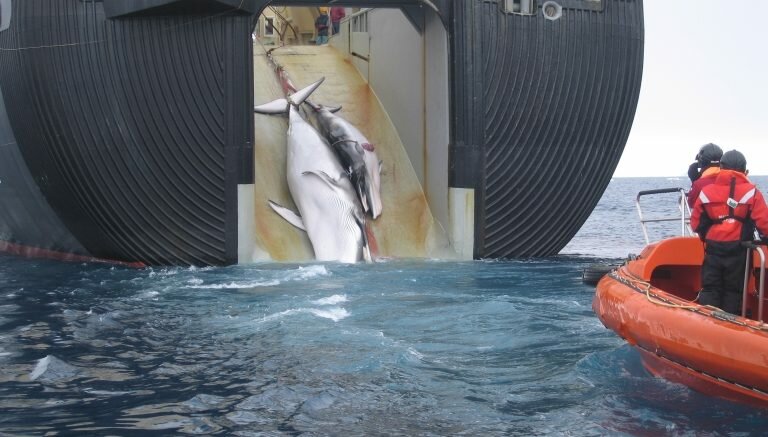Japan resumes commercial whaling, leaves IWC
Japan leaves the International Whaling Commission (IWC) and resumes, like Norway and Iceland, commercial whaling.
Norway and Iceland are still members of the IWC but have reserved themselves against the whaling commission’s 32-years-old ban on commercial whaling.
Norway sets an annual quota for minke whales, and in 2018 about 450 of a quota of 1,278 animals are caught. The quota for 2019 has not yet been set.
Japan’s decision to leave the IWC and resume commercial catching was expected as the country’s attempt to persuade the other IWC countries to open up for such harvesting was rejected in September.
After the proposal was turned down, Japan’s Minister of Fisheries, Masaaki Taniai, threatened to leave the IWC, which the country is now intending to do on June 30th 2019.
Solely in Japanese waters
– We have decided to withdraw from the International Whaling Commission to resume commercial whaling in July next year, Japanese Government spokesperson Yoshihide Suga states.
Japan’s decision means that the country now resumes catching minke whales and other species that the IWC currently holds its protective hand over.
The catch will be limited to Japan’s territorial waters and exclusive economic zones. Japan will not be able to hunt whales in Antarctica or in the Southern Hemisphere.
No repercussions for Norway
Norwegian Minister of Fisheries, Harald T. Nesvik (Progress Party), does not believe that Japan’s decision to resume commercial whaling will affect the Norwegian whaling industry.
– There will be no immediate consequences for Norway, Nesvik tells NTB.
– Norway has cooperated well with Japan in the IWC and in other international fora where the question of management of marine mammals comes up, and a normalisation of the management of whales has been important for both Norway and Japan, he continues.
Japanese whale meat will also not oust Norwegian produce, Nesvik believes.
– Whale meat trade is regulated by an international convention (CITES), and only countries that have reservations to the ban on such trade can export and import meat between themselves. The fact that Japan leaves the IWC does not change this, and we will continue to work for easier access to the Japanese market for Norwegian whale meat, the Minister of Fisheries informs.
Loophole
Up until now, Japan has exploited a loophole in the IWC’s regulations and operated so-called research catches in the Antarctic, accompanied by protests by Greenpeace and other environmentalists.
The critics believe the research catch is a sneak commercial catch and points to that the whale meat has ended up in the Japanese market.
When Japan leaves the IWC, the country cannot continue with this catch. IWC membership is a prerequisite for obtaining exemptions from the Antarctica Treaty, which prohibits all forms of whaling.
There are different views on whaling among IWC members. Japan’s proposal to open for commercial catches from 2020, on whale species that are not threatened with extinction, was rejected by 41 against 27 votes.
Criticism
The strongest resistance comes from the United States, the EU and Australia.
-Today’s announcement shows that Japan is out of step with the world community, nor does it realize that the future of our oceans and these majestic animals need protection, the Leader of Greenpeace’s Japanese branch, Sam Annesley fumes.
Australia also protests against Japan’s choice and asks the country to reverse the decision to leave the IWC.
– Australia is and remains firmly against all forms of commercial catch and so-called research catch on whales, Australian Minister for the Environment, Melissa Price announces.
Also in Japan, which traditionally consumes a lot of whale meat, the view on catch varies, and consumption has declined sharply in recent decades. A large proportion of the Japanese population now states that they rarely, if ever, eat whale meat.
Read also:
© NTB scanpix / #Norway Today




